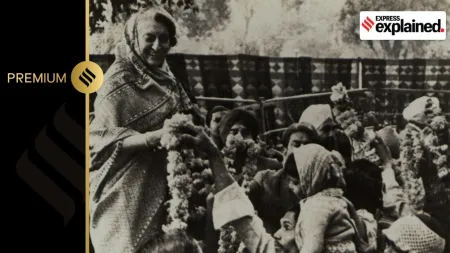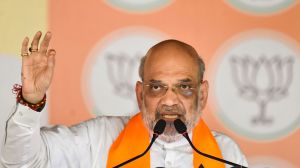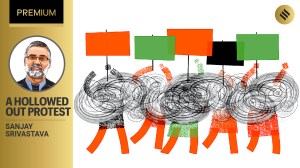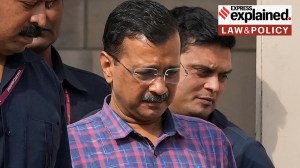- India
- International
Wrestlers return Padma honours: Looking back at ‘award wapsi’ during Indira Gandhi regime
Award wapsi, or the returning of civilian honours, is by no means a recent phenomenon in India. Two notable examples are from the Emergency period.
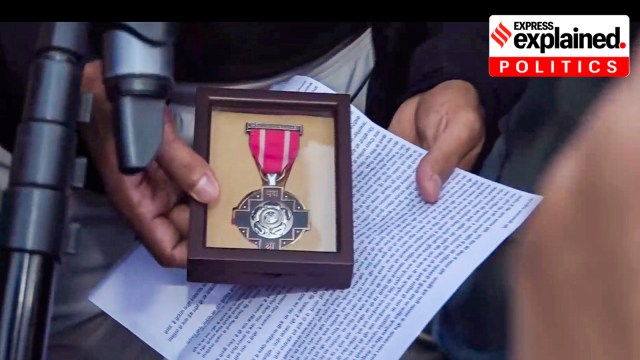 Wrestler Bajrang Punia holds his Padma Shri award near the Kartavya Path, in New Delhi, Friday, Dec. 22. (PTI Photo)
Wrestler Bajrang Punia holds his Padma Shri award near the Kartavya Path, in New Delhi, Friday, Dec. 22. (PTI Photo) Wrestler Bajrang Punia on December 22 said he was returning his Padma Shri, India’s fourth-highest civilian award, to oppose the election of Sanjay Singh, a close aide of BJP MP and sexual harassment accused Brij Bhushan Sharan Singh, as president of the Wrestling Federation of India (WFI).
Punia, who has won multiple medals for India, was stopped by the Delhi Police Friday evening at Kartavya Path when he tried to walk towards Prime Minister Narendra Modi’s residence. “I will give the Padma Shri award to anyone who will take it to PM Modi,” Bajrang said before he placed the award on the footpath and walked away.
This was followed by deaflympics gold medallist Virender Singh Yadav making a similar announcement, saying he would give up his Padma Shri in solidarity with wrestler Sakshi Malik, who quit the sport to protest Singh’s election.
Yadav posted on X, “I will also return the Padma Shri for my sister and the country’s daughter. Honourable Prime Minister Shri Narendra Modi ji, I am proud of your daughter and my sister Sakshi Malik. But I would request the top players of the country to also give their decision… @sachin_rt @Neeraj_chopra1.”
Award wapsi not new
Yadav and Punia join a long list of awardees who have returned their civilian honours in the past few years. However, “award wapsi” is by no means a recent phenomenon in India. One of the earliest examples of this goes back to 1919, when Rabindranath Tagore returned his knighthood (the tile of ‘Sir’), granted by the British, in response to the Jallianwala Bagh massacre.

In post-independence India, too, many recipients have returned awards and honours granted by the government. This is not counting those who have refused to accept the awards.
Two notable examples of ‘award wapsi’ are from the Emergency period.
During the Emergency
When former Prime Minister Indira Gandhi imposed a state of Emergency on the country, several prominent civil society members rose up in protest. Two of them went as far as to return the civilian honours granted to them — writer K Shivarama Karanth from Karnataka returned his Padma Bhushan, while author Phanishwar Nath “Renu” from Bihar gave up his Padma Shri.
A call to return awards had been given by feminist-socialist Durga Bhagwat, who remained steadfast in her opposition to the Emergency despite going to jail.
Here’s a brief biography of both writers.
Shivaram Karanth
Shivaram Karanth was born on October 10, 1902 in Kota in the Udupi district of Karnataka. He wrote about 50 novels, including Mookajjiya Kanasugalu which won him the Jnanpith Award. He also wrote around 30 plays.
 Karanth donned many hats. (Photo: Wikimedia Commons
Karanth donned many hats. (Photo: Wikimedia Commons
But apart from celebrated novelist and playwright, Karanth went on to don many hats. He was responsible for the rejuvenation of Yakshagana, a performing folk art of coastal Karnataka. His treatise, Yakshagana Bayalata, won him the Kendriya Sahitya Akademi award in 1958.
Karanath wrote volumes on science, particularly for children. He was also a passionate advocate of environmental causes, and even contested the 1989 elections from Karwar on a green plank.
He passed away on December 9, 1997, at the age of 95.
Phanishwar Nath ‘Renu’
‘Renu’ was born on March 4, 1921, in a village called Aurahi Hingna in Bihar’s Ararria. Renu belonged to an underprivileged caste, though his family was better-off and also progressive. Renu was educated in Bihar, Nepal, and Banaras, and made a name for himself in the genre of the Aanchalik Upanyas, or regional literature, where he gave voice to the struggles, triumphs, and tribulations of the usually overlooked corners of Bihar.
 Renu made a name for himself in the genre of the Aanchalik Upanyas. (YouTube/screengrab)
Renu made a name for himself in the genre of the Aanchalik Upanyas. (YouTube/screengrab)
His most notable work, Maila Aanchal, is considered aming the foremost works of Hindi literature. In 2019, PM Modi, during a visit to Forbesganj in Bihar, had quoted lines from Maila Aanchal, which roughly translate to a character saying he chooses to spend his life’s labours under the soiled aanchal of rural Bharat Mata.
Renu’s short story Maare Gaye Gulfam was adapted into the Bollywood movie Teesri Kasam, starring Raj Kapoor and Waheeda Rehman, for which he also wrote the dialogues.
Other works of his include Parti Parikatha, Paltu Babu Road, and Juloos.
The writer was awarded the Padma Shri in 1970. In 1972, he unsuccessfully contested the Assembly elections from Forbesganj.
Renu passed away on April 11, 1977, at the age of 56.
Apart from the Emergency
Renu and Karanth were not the only writers to give up their awards in protest against the Indira government.
In 1984, poet and novelist Khushwant Singh returned his Padma Bhushan, awarded in 1974, to protest Operation Blue Star at the Golden Temple.
In the same year, Kashmiri writer Akhtar Mohiuddin returned the Padma Shri, which he received in 1968, over the hanging of Kashmiri separatist Maqbool Bhat.
More Explained
EXPRESS OPINION
May 11: Latest News
- 01
- 02
- 03
- 04
- 05





